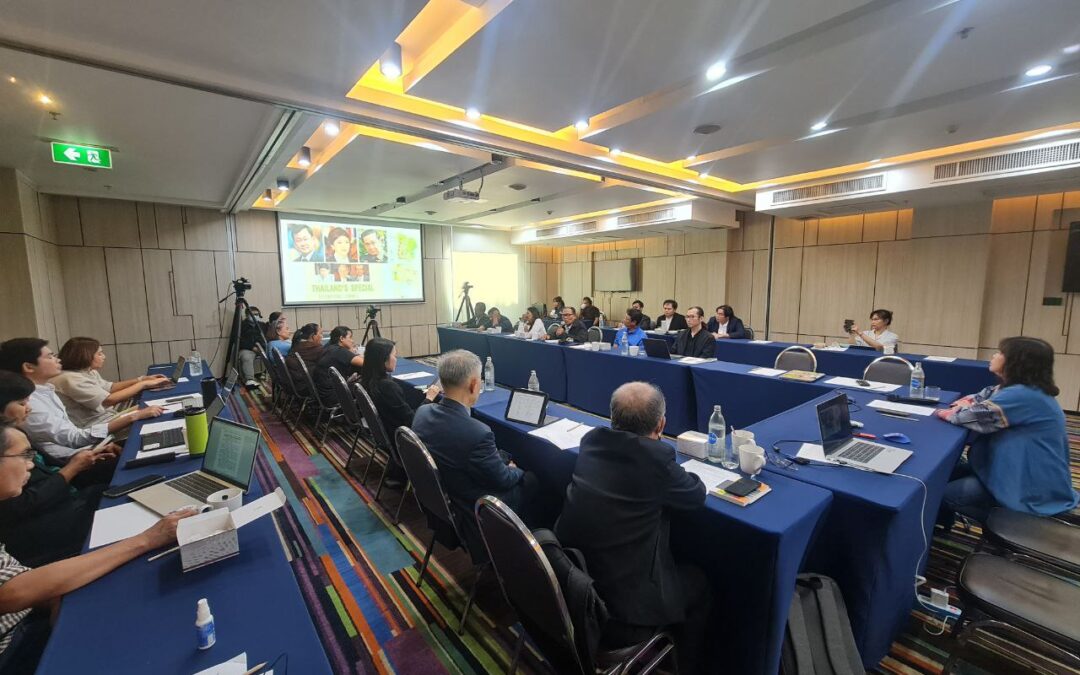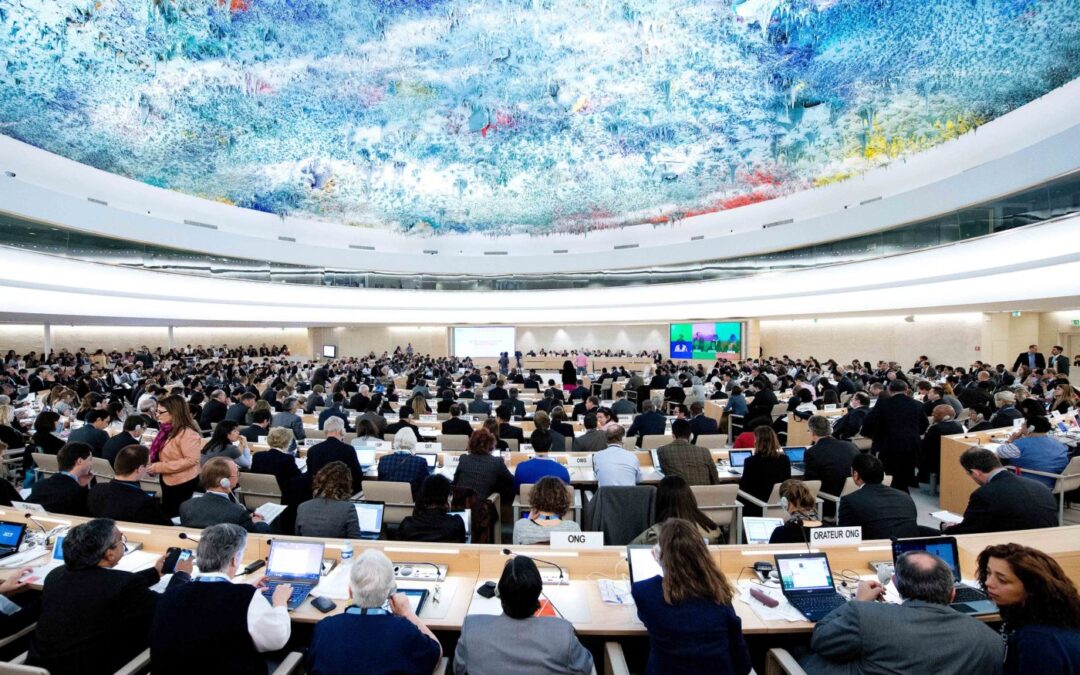
Nov 30, 2023 | Advocacy, Analysis briefs, News
The International Commission of Jurists (ICJ), in an amicus curiae brief submitted today, has requested the East Jakarta District Court to give effect to Indonesia’s international legal obligations concerning freedom of expression and information in their adjudication of a case concerning criminal charges against two human rights defenders, Haris Azhar and Fatia Maulidiyanti.

Nov 24, 2023 | Events, News
“The law governing the development of Thailand’s Eastern Economic Corridor (EEC) must be evaluated and revised to address concerns raised by local communities, and align with Thailand’s international human rights obligations,” concluded participants at a dialogue hosted by the International Commission of Jurists (ICJ), Land Watch Thai, EEC Watch, ENLAW Thai Foundation, and Thai Public Broadcasting Service (Thai PBS) in Bangkok, on 22 November 2023.
Participants shared recommendations aimed at improving the Eastern Special Development Zone Act B.E. 2561 (2018) (‘EEC Act’), which governs the operation of the EEC, to better serve the rights and interests of persons in affected communities. These suggestions will be compiled by the organizers and submitted as part of the official consultation process during the 2024 evaluation by the Office of the Eastern Special Development Zone Policy Committee (‘EEC Office’).
The EEC is a special economic zone in Thailand being developed in the eastern coastal provinces of Rayong, Chonburi, and Chachoengsao, along the Gulf of Thailand. Its objective is to promote investment in next-generation industries utilizing innovation and high technology.
“The EEC Act, however lofty are its stated aim, fails to incorporate adequate protection of human rights. While the EEC Act nominally acknowledges international human rights standards such as the United Nations Guiding Principles on Business and Human Rights’ protect, respect, and remedy framework, as well as the principle of promoting and protecting human rights in policy preparation, it fails to provide for adequate means to ensure implementation of these and other human rights standards,” said Sanhawan Srisod, ICJ’s Legal Adviser.
“According to Thai law, the evaluation must achieve goals that include aligning the law with Thailand’s international obligations under international law. Therefore, the EEC Office cannot complete the evaluation process without thoroughly addressing current gaps in compliance,” added Srisod.
The ICJ recommendations presented include the need to incorporate safeguards against forced eviction, in accordance with international human rights law, and to recognize the social, cultural, spiritual, economic, environmental, and political value of land for communities, with special emphasis on the significance for tenant farmers and small-scale food producers. Responsible land-based investments and implementing human rights due diligence are also critical elements.
A survey conducted before the dialogue with 44 affected individuals in Chonburi and Rayong provinces revealed a pattern of practices that fail to comply with Thailand’s international human rights obligations. They include:
- Lack of adequate participation of residents in the consultation process of the EEC Act.
- Absence of representation of locally affected individuals/communities in the Committee overseeing the EEC, primarily composed of governmental authorities and representatives from business sectors.
- The EEC Committee and Office hold overly broad powers without adequate checks and balances.
- The absence of effective grievance and compliance mechanisms within the EEC Office.
- Disregard for the impact of activities on local livelihoods during policy implementation.
- Ineffectiveness and inadequacy of remedies provided for individuals affected by EEC operations.
Participants suggested amending the EEC Act to address these concerns and ensure real participation, inclusiveness, adequate livelihood, a healthy environment, effective remedies, and other human rights of communities in the area.
Additionally, it addressed ongoing litigation initiated by communities challenging town planning within the EEC, specifically challenging the re-designation of agricultural, natural, and environmental reserved zones to industrial zones, which is currently pending before the Central Administrative Court.
Background
The participants comprised 30 affected individuals living in the areas of the EEC and civil society actors. This is the second dialogue following the initial one in June 2023, addressing the same topic.
According to the Act on Legislative Drafting and Evaluation of Law B.E. 2562 (2019), all Thai laws must undergo outcome evaluation at least every five years.
Speakers at the dialogue included:
- Chanchao Chaiyanukit, Former Permanent Secretary of the Ministry of Justice
- Pornpana Kuaycharoen, Land Watch Thai
- Sanhawan Srisod, ICJ
- Saowaruj Rattanakhamfu, Thailand Development Research Institute (TDRI)
- Somnuck Jongmeewasin, EEC Watch
- Sondhi Kodchawat, Environmental Researcher
- Sumitchai Hattasan, Center for Protection and Revival of Local Community Rights
- Supaporn Malailoy, ENLAWThai Foundation
- Sutthikiat Kodchaso, ENLAWThai Foundation
Contact
Sanhawan Srisod, ICJ Associate International Legal Adviser, e: sanhawan.srisod@icj.org
Further reading
Thailand: laws governing development of Eastern Economic Corridor and Special Economic Zones fail to adequately protect human rights – ICJ report

Oct 11, 2023 | Advocacy, News
The International Commission of Jurists (ICJ) called the Human Rights Council’s (HRC) attention to the entrenched pattern of human rights violations in Cambodia, and called on the HRC to adopt a resolution to extend the Special Rapporteur’s mandate and ensure it has adequate resources and support.
Oral statement of the International Commission of Jurists (ICJ) during the Interactive Dialogue with the Special Rapporteur on the situation of human rights in Cambodia
“Madam Vice President,
The International Commission of Jurists (ICJ) concurs with the Special Rapporteur’s assessment that Cambodia has largely failed to implement the 20 human rights-related benchmarks proposed in his previous report to this Council.
In the lead-up to the national elections, there was a rapid escalation of the human rights and rule of law crisis in Cambodia. Human rights defenders and political opponents were convicted based on non-human rights compliant laws for exercising their right to freedom of expression, both online and offline, with new draconian laws on cybercrime and cybersecurity being drafted and considered.
The authorities have arbitrarily revoked licenses and blocked online access to independent media outlets without due process. The government at the highest level has employed rhetoric, reproduced online, to threaten and incite violence against political opponents with impunity, with credible reports of actual physical violence as an apparent consequence.
This systematic disregard for Cambodia’s international human rights obligations has been further exacerbated by the absence of an independent and impartial judiciary. The convictions of human rights defenders and political opponents were frequently accompanied by massive fair trial violations, including the effective application of a presumption of guilt.
It is imperative that the Council responds decisively to reverse this entrenched pattern of human rights violations in Cambodia by adopting a resolution to extend the Special Rapporteur’s mandate and ensuring it has adequate resources and support.
Thank you.”
Contact
Sandra Epal Ratjen, ICJ UN Representative and Senior Legal Adviser, e: sandra.epal@icj.org
Daron Tan, ICJ Associate International Legal Adviser, e: daron.tan@icj.org

Sep 28, 2023 | News
The ICJ is concerned at Thailand’s continued failure to bring justice to the loved ones of Karen activist Pholachi ‘Billy’ Rakchongcharoen, who was the victim of an apparent enforced disappearance in 2014, and apparent subsequent killing.
The ICJ calls on the responsible authorities to ensure that there is continuous effective investigation to determine definitively the fate of Billy and deliver justice to his family.
Today, Thailand’s Criminal Courts for Corruption and Misconduct Cases acquitted four Kaeng Krachan National Park officials, the last individuals seen with Billy, of murder-related charges, including premeditated murder and concealing the victim’s body. Only one of the accused, Chaiwat Limlikit-aksorn, former chief of Kaeng Krachan National Park, was convicted of charges and sentenced to three years in prison related to “malfeasance in office” for failing to hand Billy over to the responsible authorities after his arrest.
The Court, constituted of a panel of two judges, indicated that it did not believe that Billy had been released as claimed by the accused. Nevertheless, the Court concluded that there was not sufficient evidence to prove that the park officials orchestrated the killing.
“More than nine years of delays, including by inaction by the government until recently, and still no justice, is a blow to the victims. This constitutes yet another marker of Thailand’s consistent failure to hold accountable perpetrators of serious human rights crimes, potentially committed by State authorities,” said Sanhawan Srisod, ICJ Legal Adviser.
Billy was the victim of an apparent enforced disappearance, as he was last seen on 17 April 2014 in the custody of Kaeng Krachan National Park officials. The officials claimed they detained Billy for illegal possession of honey, but that they released him later the same day.
On 12 September 2019, the DSI located bone fragments, along with an oil tank submerged in water, which they identified as likely belonging to Billy. The subsequent DNA test indicated a maternal relation between the fragment and Billy’s mother, suggesting a blood relationship through the maternal line. However, the Court ruled today that there was insufficient evidence to establish that they belong to Billy, as opposed to other relatives who may have passed away during the same period.
This decision was made despite testimony from State forensic experts affirming the validity of the DNA test used in this case, which needed to be considered alongside other supporting facts. This includes testimonies given by the relatives and cultural expert about the absence of known blood relatives who had passed away without knowledge, and the Karen practice of not scattering the remains of the deceased in the river. Such testimony also aligns with the opinions of international forensic experts, specifically the Independent Forensic Expert Group established by the International Rehabilitation Council for Torture Victims, who were consulted by the prosecutors’ lawyers.
Enforced disappearance was recently made a specific crime under Thai law, following the adoption of the long-delayed Act on Prevention and Suppression of Torture and Enforced Disappearance, which came into effect in February this year. Under the Act, and international law, enforced disappearance is a continuous crime, which is not completed until the fate or whereabouts of the victim becomes known. Therefore, to the extent that there is any doubt that the discovered remains belonged to Billy, the crime must be considered to be ongoing and the law is applicable to Billy, even if it was not in force when he first “disappeared.”
Nevertheless, the Prosecution did not attempt to charge the accused with enforced disappearance, and the Court consistently rejected any reference to the crime made by the prosecution during the proceedings. This includes the rejection of expert witnesses proposed by the prosecutor’s lawyers who intended to testify about international law and standards governing enforced disappearance, following the rejections made by the accused.
“It is also unfortunate that the Thai court did not take into consideration the specific nature of the crime of enforced disappearance, often accompanied by very limited circumstantial evidence, which may be the only available means of establishing the crime. Such a crime also normally includes the powerlessness of the victim in the hands of the authorities, the use of state power to destroy direct evidence in an attempt at total impunity or to create the illusion of a perfect crime, all factors that have been taken into consideration in many cases in various jurisdictions worldwide when assessing the possible involvement of the suspects in crimes of this nature,” added Srisod.
During the trial, pursuant to the Act on Establishment of the Criminal Court for Corruption Cases B.E. 2559 (2016), the Court also used the so-called inquisitorial system, which is new to both lawyers and public prosecutors accustomed to the accusatorial style of the usual Thai court system. In this regard, lawyers voiced complaints that the judge on several occasions cut short the follow-up questions that the lawyers had planned to ask, citing that these issues had already been covered during their own examinations and other written submissions.
Background
Chaiwat Limlikit-aksorn was convicted under section 157 of the Criminal Code and section 123 of the Organic Act on Counter Corruption B.E. 2542 (1999).
Thailand has signed but not yet ratified the International Convention for the Protection of All Persons from Enforced Disappearance (ICPPED) and is a State Party to the International Covenant on Civil and Political Rights (ICCPR) and the Convention against Torture and other Cruel, Inhuman or Degrading Treatment or Punishment (CAT). The latter two treaties prohibit conduct making up enforced disappearance, and the crime is recognized as violation of both treaties.
The National Human Rights Commission of Thailand and local Thai Civil Society Organizations continue to receive complaints of alleged human rights violations at the hands of security forces constituting serious criminal conduct, including extraterritorial killings, torture and other ill-treatment, and enforced disappearances.
Between 1980 and August 2023, the UN Working Group on Enforced or Involuntary Disappearances also recorded and transmitted 93 cases of alleged enforced disappearance to Thailand. Currently, 77 of these cases remain unresolved.
Unfortunately, the number of cases in which these allegations have been investigated, let alone perpetrators prosecuted, remains low, as are instances where there has been access to effective remedies and provision of reparations for victims. In several instances, alleged victims of torture and other ill-treatment or the families of those who died as a result of these abuses have received some monetary payments falling short of full reparation, but the perpetrators have not yet been brought to justice.
This case also follows the acquittal of five police officers charged with the robbery and coercion of the “disappeared” human rights lawyer Somchai Neelapaijit in December 2015 due to a lack of evidence.
Further reading
Thailand: Indictment of park officials for killing of “Billy” is a significant step towards justice
Thailand: discovery of “Billy’s” remains should reinvigorate efforts to identify perpetrator(s)
Thailand: special investigation into apparent enforced disappearance of “Billy” welcome, but much more is needed
Thailand: ICJ submits recommendations on draft law on torture and enforced disappearance amendments
Justice for Billy: Time for Thailand to Account for Activist’s Disappearance
Contact
Sanhawan Srisod, Associate International Legal Adviser, ICJ, e: sanhawan.srisod@icj.org

Sep 27, 2023 | Advocacy, News
The International Commission of Jurists (ICJ) and four other organizations condemn in the strongest possible terms the arbitrary execution of Mr. Lê Văn Mạnh in violation of his right to life and freedom from torture and cruel, inhuman or degrading punishment. He was executed despite credible allegations that Mr. Lê Văn Mạnh had been subjected to severe beatings amounting to torture by the police in order to extract a “confession,” which was relied on at trial to convict him.
Despite the public outcry and the persistent calls within the international community for an impartial, independent and effective review of his case, the authorities proceeded with the execution of Mr. Lê Văn Mạnh on 22 September 2023, in defiance of international law and contrary to the global trend towards establishing a moratorium on the use of the death penalty and abolition of the death penalty.
According to the death certificate issued by Thu Phong village, Cao Phong district, Hòa Bình province that Mr. Lê Văn Mạnh’s family received on 23 September 2023, he was executed at 7am on 22 September 2023. His execution was carried out only four days after his mother had received the notification from the People’s Court of Thanh Hóa, informing her that as Mạnh’s relative, she could apply in writing to receive her son’s ashes or corpse.
The execution notice issued by Thanh Hóa province police indicates that the responsible authorities had exchanged two official letters in August 2023 to uphold the decision to carry out Mạnh’s execution. This means they had waited for more than one month before notifying Mạnh’s family about his impending execution, hindering any efforts by his family and the public to call for an immediate halt of the execution. Additionally, the notification letter shared with the family did not include the date of the set execution and the family was not given the opportunity of a last visit – a cruel, inhuman and degrading treatment that international human rights bodies have repeatedly condemned.
Allegations of violations of due process and procedural irregularities
Lê Văn Mạnh had been convicted of robbery, rape, and murder of a 14-year-old girl – Hoàng Thị Loan – in July 2005.
According to the case’s official records, the victim, Hoàng Thị Loan, was raped and murdered in Yên Thịnh Ward, Yên Định District, Thanh Hóa Province, in March 2005. On 20 April 2005, Lê Văn Mạnh, who was 23-year old at the time, was arrested pursuant to a temporary arrest warrant issued by the investigative police unit of Đồng Nai Province for an entirely different matter earlier that month.
However, according to the criminal complaint, just three days later, by 23 April 2005, a “confession” letter, claimed to be written by Mạnh while in police detention addressed to his father, had surfaced, admitting guilt to the rape and murder of Hoàng Thị Loan. The police confiscated this letter and used it to prove Mạnh’s guilt. The criminal complaint further showed that the investigation relied on the testimony of a 9-year-old child – who was interviewed by the police without parental permission – for leads.
Between 2005 and 2008, Mạnh underwent a total of seven court hearings, including three trials, three appeals, and one cassation trial. In all of his court hearings, Mạnh vehemently denied all of the charges and retracted his earlier “confession”, alleging that he had to provide it after being beaten by both the police officers investigating his case and his cellmates who were acting under police’s instructions.
There was no physical evidence to tie Mạnh to the alleged rape and murder. The only evidence presented by the prosecution was Mạnh’s “confession” letter, which he had already retracted because it was allegedly obtained under duress and torture. Nevertheless, Lê Văn Mạnh was convicted of the rape and murder of Hoàng Thị Loan and sentenced to death.
Recommendations
The execution was arbitrary, as it took place as a consequence of a denial of the right to fair trial among other rights. The execution also is contrary to repeated resolutions of the UN General Assembly and the overall global trend towards establishing a moratorium on the use of the death penalty with a view to abolition. We strongly urge the authorities to:
- Immediately halt all pending executions and establish a moratorium on executions with a view to abolishing the death penalty in Việt Nam;
- Initiate prompt, impartial and effective investigations into the allegations of torture or other cruel, degrading or inhuman treatment with a view to gaining a “confession” from Mr. Lê Văn Mạnh, noting that his was not the only case where there had been allegations of torture being used to extract a “confession” later used as evidence at trial, which resulted in the imposition of the death penalty; and
- Ensure that there is full transparency in the use of the death penalty, including through ensuring that essential information relevant to a specific planned execution is promptly provided to the prisoner and their family, and making publicly available information regarding death sentences, pardons, number of people on death row, notifications of any set executions and executions carried out.
Background
The UN General Assembly, in repeated resolutions and by overwhelming majorities, most recently in General Assembly Resolution 77/222 of 15 December 2022, has called on all States that retain the death penalty to impose an immediate moratorium on executions, with a view to abolition.
In line with opinions shared by many governments and the United Nations, we emphasize that the death penalty constitutes a denial of the right to life protected by Article 6 of the International Covenant on Civil and Political Rights (ICCPR) to which Việt Nam is a State party; and that it constitutes a form of cruel, inhuman or degrading punishment, prohibited under Article 7 of the ICCPR and the UN Convention against Torture and Other Cruel, Inhuman or Degrading Treatment or Punishment (UNCAT). Countries like Việt Nam where the death penalty is imposed, must ensure, at a minimum, that it is only used in cases of “the most serious crimes” (i.e. intentional killing) following a trial that meets the highest level of compliance with international law and standards of fairness.
As the UN Human Rights Committee noted: “Violation of the fair trial guarantees provided for in article 14 of the Covenant in proceedings resulting in the imposition of the death penalty would render the sentence arbitrary in nature, and in violation of article 6 of the [ICCPR]” (General Comment No. 36 – Article 6: right to life, UN Doc. CCPR/C/GC/36, para. 41). Mạnh’s trial was clearly neither fair nor compliant with international human rights law.
Furthermore, as a State party to the UNCAT and the ICCPR, Việt Nam has an obligation to respect the prohibition of torture and other forms of ill-treatment at all times.
Article 15 of the UNCAT obliges State parties to “ensure that any statement which is established to have been made as a result of torture shall not be invoked as evidence in any proceedings.” International law prescribes that State parties must conduct prompt, impartial and thorough investigations when complaints of torture or other ill-treatment are made (Articles 12 and 13, UNCAT; and Articles 7 and 2(3), ICCPR). In addition, State parties must provide prompt and effective access to effective remedies and full reparations for victims of torture and other ill-treatment (Article 14, UNCAT, and Article 7 in connection with Article 2(3), ICCPR).
Signatories
Amnesty International
International Commission of Jurists
Legal Initiatives for Vietnam
People in Need
Vietnamese Advocates for Change








